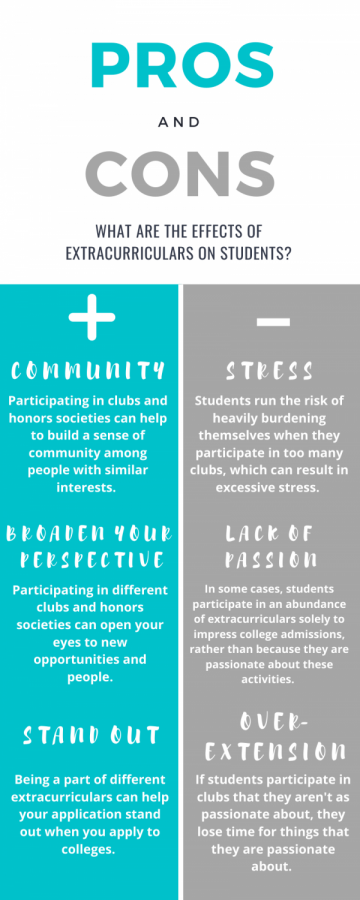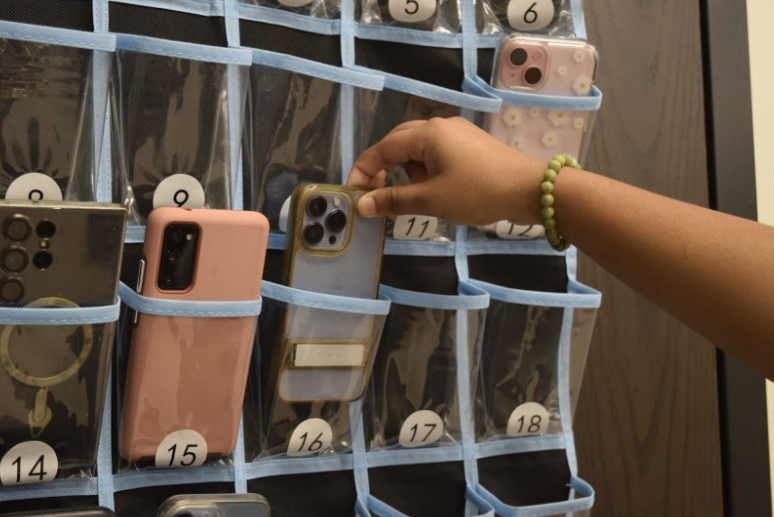Come spring, several honor societies open their gates to floods of applications. Collecting signatures, students race around the school, trying to prove their participation in clubs, sports and other extracurriculars. Already overworked students are trying to join every club in school to stand out to colleges, but how beneficial is this culture to the students that are a part of it?
Since starting high school, I have been hit with an onslaught of extracurriculars. In middle school, my teachers insisted that getting involved in high school would help me in many ways, but failed to mention the added stress that these activities cause–and the decline of their appeal to colleges. Now, students overload their schedules with these advantageous opportunities, but they come with these costs.
One witness of this harmful process is Rho Kappa president and senior Jon Ma, who started joining honors societies during his freshman year, all in the effort to impress colleges.
“It seems like an expectation to be a part of these [clubs]. I feel like there’s this big school culture around preparations for college applications and about looking the most prestigious on a resume and on a piece of paper,” Ma said. “Everyone just passively agrees to that sort of culture.”
Students feel that they must join sports, clubs and especially honor societies in order to stand out to colleges. They become members of an extensive amount of extracurriculars, all of which expect students’ time and energy. This has created an ‘arms race’ to participate in as many extracurriculars as possible.
“[It is like] the same pressure that students feel to have a 4.0 [GPA], but we all know that there [are] a lot of 4.0’s out there,” Spanish teacher and National Honor Society (NHS) sponsor Eileen Rodriguez-Kiser said. “So how do we set ourselves apart, how do we show that we are more than just our grade point average? Organizations and participation in something like NHS gives them that opportunity.”
This is not to say that honor societies are not beneficial. They provide service opportunities, which usually do help to make the school and community a better place, and help the students themselves feel better about their contributions to the world. In addition, they offer students a chance to interact with peers who are also interested in a certain academic subject, creating a sense of community.
“There are some clubs where you meet new people,” member of many activities and senior Angie Jia said. “Also, [when you have] those experiences [in] some volunteering opportunities, you do things you never thought you would do.”

A graphic displaying the pros and cons of participating in extracurricular activities.
However, these gains come at a price. In order to stand out to colleges by creating extensive resumes, students actively risk their mental health, becoming overwhelmed with the number of extracurriculars they join. In addition, students can only list ten extracurriculars on the Common App, a platform that allows students to apply to multiple schools at once, meaning that many activities become superfluous.
“[Being a part of many extracurriculars] overextends kids in too many responsibilities and makes them too stressed out. It becomes a stressor in people’s lives more than a benefit,” Ma said. “The push for people to be in as many [extracurriculars] as possible is not healthy.”
Over-involvement in activities students are not passionate about is detrimental; students are stretching themselves too thin. Overworking ourselves to be a part of too many activities only adds to our already busy lives.
“People can get too stressed [if they are in too many extracurriculars],” Jia said. “You stress about things that don’t really matter, especially trying to get all these service hours when you can’t even juggle your own life.”
It is important to know that you are not defined by the number of activities you are in, but rather by the merit of your work and your passion for it. Even though it may be hard, letting go of what we are not truly passionate about is the healthiest way to avoid the burden of stress.
“[Looking back,] I probably would have focused on something I’m actually passionate about, and not [done honor societies] just to do them,” Jia said. “I feel like once you like what you’re doing, it can be stressful, but you’re also getting enjoyment out of it.”

![Focusing on her homework, senior Angie Jia demonstrates the amount of work brought on by over-involvement. Jia is involved in many clubs and honor societies and has been since the beginning of her high school career. “The honor societies, sometimes I regret doing them because they don’t really mean anything,” Jia said. “I guess now that you’re in them you just stay because you want a cord [for graduation].”](https://pwestpathfinder.com/wp-content/uploads/2020/03/Angie-graphic-copy-900x600.jpg)

![Senior Dhiya Prasanna examines a bottle of Tylenol. Prasanna has observed data in science labs and in real life. “[I] advise the public not to just look or search for information that supports your argument, but search for information that doesn't support it,” Prasanna said.](https://pwestpathfinder.com/wp-content/uploads/2025/10/DSC_0073-2-1200x800.jpg)
![Junior Fiona Dye lifts weights in Strength and Conditioning. Now that the Trump administration has instituted policies such as AI deregulation, tariffs and university funding freezes, women may have to work twice as hard to get half as far. "[Trump] wants America to be more divided; he wants to inspire hatred in people,” feminist club member and junior Clara Lazarini said.](https://pwestpathfinder.com/wp-content/uploads/2025/05/Flag.png)
![As the Trump administration cracks down on immigration, it scapegoats many immigrants for the United States’ plights, precipitating a possible genocide. Sophomore Annabella Whiteley moved from the United Kingdom when she was eight. “It’s pretty scary because I’m on a visa. When my visa expires next year, I’m not sure what’s going to happen, especially with [immigration] policies up in the air, so it is a concern for my family,” Whiteley said.](https://pwestpathfinder.com/wp-content/uploads/2025/05/DSC_0077-7copy.jpg)
![Shifting global trade, President Donald Trump’s tariffs are raising concerns about economic stability for the U.S. and other countries alike. “[The tariffs are] going to pose a distinct challenge to the U.S. economy and a challenge to the global economy on the whole because it's going to greatly upset who trades with who and where resources and products are going to come from,” social studies teacher Melvin Trotier said.](https://pwestpathfinder.com/wp-content/uploads/2025/05/MDB_3456-1200x800.jpg)



![Some of the most deadly instances of gun violence have occurred in schools, communities and other ‘safe spaces’ for students. These uncontrolled settings give way to the need for gun regulation, including background and mental health checks. “Gun control comes about with more laws, but there are a lot of guns out there that people could obtain illegally. What is a solution that would get the illegal guns off the street? We have yet to find [one],” social studies teacher Nancy Sachtlaben said.](https://pwestpathfinder.com/wp-content/uploads/2025/01/DSC_5122-1200x800.jpg)





Kate Piffel • Mar 12, 2020 at 9:37 am
Thank you for writing this article! I do believe it is so important to find your passion – and we are fortunate to have many opportunities for our students that other schools might not have. But I believe students should be well-rounded and learn about themselves in high school, it should not a “race to the top.” I appreciate your viewpoint – your voices are the most important.